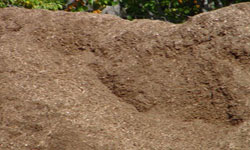
A new initiative for the production of compost, which will help reduce regulation for farmers who use compost on their land was launched today by WRAP (Waste & Resources Action Programme) and the Environment Agency.
Martin Brocklehurst, Head of Environmental Protection External Programmes for the Environment Agency, said: "Under the Quality Protocol for Compost, producers will be able to create compost which is no longer classed as a waste, making it a more attractive product to those who buy it such as farmers, as it allows them to spread compost on to land without the need to register with the Environment Agency for a waste exemption."
"Farmers buying compost produced under the Quality Protocol can be confident that the compost they are buying will be of a high environmental standard."
The Quality Protocol, which will apply in England and Wales, has been developed with key players in the composting industry, including The Composting Association (TCA) and the Environmental Services Association (ESA), and sets out criteria for the production of quality compost from different types of source segregated biowaste like food and garden plant waste.
The Quality Protocol will also benefit local authorities, compost customers and composting producers by:
· allowing local authorities to be more confident that organic waste that they send for recycling is composted to a high standard helping them to meet Landfill Allowance Trading Scheme (LATS) targets;
· protecting the environment (including soil) and human health – by describing acceptable best practice for the use of quality compost on land;
· easing regulation – by defining when the compost ceases to be waste and waste regulatory controls are no longer required.
The Quality Protocol has been published today and will come into force at the end of Compost Awareness Week (6 – 12 May 2007). This will give producers and users time to put in place any additional measures necessary to meet the requirements of the Protocol before it comes into effect.
WRAP's Director of Organics Richard Swannell commented: "The implementation of the Quality Protocol will give farmers increased opportunity to use compost free of waste regulations. The protocol includes very clear guidelines on how compost should be used in such a way as to protect the environment and human health. It also enforces traceability which will make compost easier and safer to use than ever before."
Recent long-term agricultural trials have proven the benefits of using compost, including a reduced need for inorganic fertilisers, a long-term improvement in soil structure, and increased yields. Using compost also helps farmers maintain soils in Good Agricultural and Environmental Condition (GAEC) and can be used as part of the criteria for securing support through the Single Farm Payment scheme."
As part of the new Quality Protocol customers who use quality compost in either agriculture or soil-grown horticulture will need to keep records about when, where and how much compost was applied to the soil.
These records should be made available or given to the compost producer within 12 months of receipt of the compost, to allow the producer to demonstrate to the certification body that environmental harm did not occur when the compost was used. An online is being developed which will enable farmers and others who spread compost onto land to submit this information direct to the certification body.
Farmers who buy compost which has not been certified under the Quality Protocol will find it is still considered a waste and therefore waste regulation controls will still apply to the handling, transport and the application of compost.
Jane Gilbert, The Composting Association Chief Executive, said:
"Quality standards have been a key factor in the growth of the composting industry and with more than 100 producers on the BSI PAS 100 certification scheme – a scheme established for producers to reach a market specific standard with a minimum quality baseline for their product – it was appropriate to build the framework of the Quality Protocol around it."
The Composting Association operates a certification scheme to BSI PAS 100, which is being upgraded to incorporate the additional requirements of the Quality Protocol. The certification scheme is currently in the process of being contracted out to independent certification bodies and hand-over of each producer on the scheme will start from 1st June 2007. In the meantime, all certifications will continue to be managed by the Composting Association.
For further information on the Quality Protocol and its implementation, visit www.environment-agency.gov.uk
